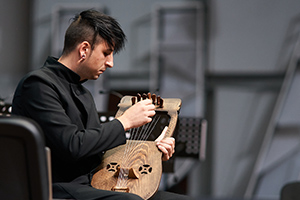
27.3 Verbal Aspect (Other Types of Aspectual Pairs)
In this module, you will be introduced to other types of aspectual pairs, in which the perfective verb is not formed with the help of a prefix.
Завдання 1
Mark all forms of the verb “to study in depth/to learn” in the dialogue below. Then answer the questions that follow.
Важли́во!
A significant number of aspectual pairs look different from the unprefixed imperfective – prefixed perfective pattern, which you have seen in the modules so far.
As in the example from the dialogue above, some pairs have an imperfective verb that ends in -ати (-яти) and a perfective verb that ends in -ити:
вивча́ти – ви́вчити
(note also the change in the stress)
Another example of this pattern is the aspectual pair замовля́ти – замо́вити (to order). Note both the change in the stress and the presence of -л- in the imperfective verb.
Завдання 2
For each question you hear, indicate what kind of action is expressed by means of the verbs “to order” or “to study in depth/to learn.” Then answer the questions that follow.
Завдання 3
Note the differences between the imperfective and perfective verbs in the photo captions below. Then answer the questions that follow.
 Я давно́ не отри́мувала подару́нків! А сього́дні отри́мала подару́нок-сюрпри́з від по́други. |
 Я ду́же до́вго не купува́в смартфо́на. Але́ вчо́ра наре́шті купи́в. |
Важли́во!
Another common pattern in aspectual pairs is when the imperfective verb has the -ува- (sometimes -юва-) suffix and the perfective one does not, having instead the vowel -a- or -и-.
Remember the following pairs:
with the vowel -a- in the perfective:
- отри́мувати – отри́мати (to receive)
- відві́дувати – відві́дати (to visit)
- пока́зувати – показа́ти (to show)
with the vowel -и- in the perfective:
- купува́ти – купи́ти (to buy)
- закі́нчувати-закі́нчити (to finish/to graduate)
- запро́шувати – запроси́ти (to invite;
note also the ш-с alternation!) - одру́жуватися – одружи́тися (to get married)
- запі́знюватися – запізни́тися (to be late)
- захо́плюватися – захопи́тися (to be/get passionate about sth.)
- закі́нчуватися – закі́нчитися (to end – when talking about something coming to an end)
Завдання 4
Mark all the perfective verbs in the short dialogues below. Then answer the questions that follow.
Завдання 5
Listen to the sentences and indicate whether the verb in it denotes a one-time action (оди́н раз) or a repeated action (бага́то разі́в). Then answer the questions that follow.
Завдання 6
Complete the sentences below with the most appropriate verbs from the bank.
Завдання 7
Note the differences between the imperfective and perfective verbs in the photo captions below. Then answer the questions that follow.
Завдання 8
Complete the sentences below with the most appropriate verbs from the bank.
Завдання 9
Complete the sentences below using the perfective counterparts of the imperfective verbs that you hear. Make sure to put each perfective verbs in the forms required by the context.
Мовний пазл
Look through the activities you have just completed and choose the correct statements to summarize what you have learned.
А тепе́р тест!
Complete the dialogue below by providing the appropriate verbs. Select words from the bank, either using them in the infinitive or changing their form to the past tense, as required by the context. You should use each verb only once.




